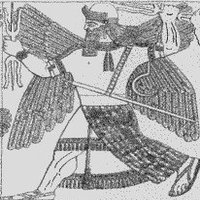
Marduk
CBUB Wins: 1
CBUB Losses: 2
CBUB Ties: 0
Win Percentage: 33.33%
Added by: Dinsdale Piranha
Read more about Marduk at: Wikipedia
Official Site: Public Domain
Marduk (Sumerian spelling in Akkadian: AMAR.UTU "solar calf"; perhaps from MERI.DUG; Biblical Hebrew Merodach; Greek , Mardochaios) was the Babylonian name of a late-generation god from ancient Mesopotamia and patron deity of the city of Babylon, who, when Babylon became the political center of the Euphrates valley in the time of Hammurabi (18th century BCE), started to slowly rise to the position of the head of the Babylonian pantheon, a position he fully acquired by the second half of the second millennium BCE.
According to The Encyclopedia of Religion, the name Marduk was probably pronounced Marutuk. The etymology of the name Marduk is conjectured as derived from amar-Utu ("bull calf of the sun god Utu"). The origin of Marduk's name may reflect an earlier genealogy, or have had cultural ties to the ancient city of Sippar (whose god was Utu, the sun god), dating back to the third millennium BCE.
In the perfected system of astrology, the planet Jupiter was associated with Marduk by the Hammurabi period.
Marduk's original character is obscure but he was later on connected with water, vegetation, judgment, and magic. He was also regarded as the son of Ea (Sumerian Enki) and Damkina and the heir of Anu, but whatever special traits Marduk may have had were overshadowed by the political development through which the Euphrates valley passed and which led to people of the time imbuing him with traits belonging to gods who in an earlier period were recognized as the heads of the pantheon. There are particularly two gods—Ea and Enlil—whose powers and attributes pass over to Marduk.
CBUB Match Record:
No Regular Play Records Available
